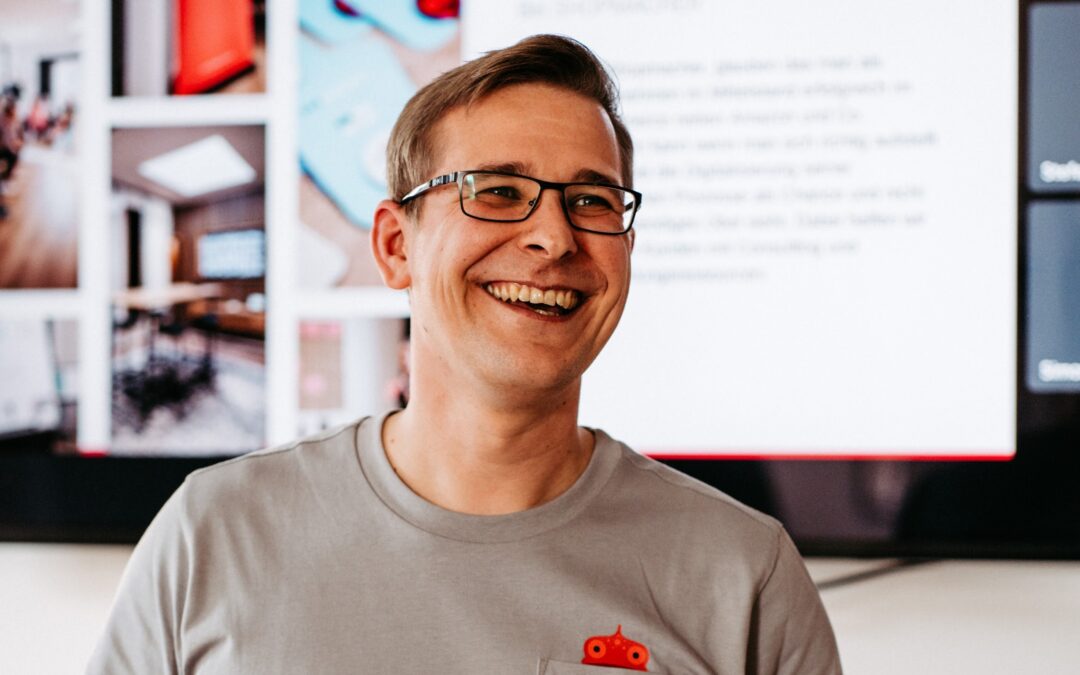In focus: From intern to key figure
Lena’s Journey to Team Coach

Surname:
Lena Böing
Position:
Team Coach
Age:
35
Training:
B. Sc. Print and media technology
“I see myself like a trusted teacher at school”
Lena, tell us about your journey: How did you go from being an intern to a team coach at SHOPMACHER?
I studied printing technology in Wuppertal, which included an e-commerce course. I needed to find an internship and wanted something close to home – that’s how I came to SHOPMACHER. During my internship, I didn’t have a fixed position but was involved in the company’s change process. After I was hired, I started in support and then moved into project management – a role that fit well with the skills I brought to the table.
What motivates you to keep developing, and what role did SHOPMACHER play in that?
At first, during my internship and early days, everything was new, and I had to find my way. I tried out different things and found many aspects exciting. But there wasn’t that one thing I was truly passionate about. When the company-wide change process introduced the Scrum framework, I was really curious and wanted to learn more. Suddenly, the role of Scrum Master seemed like something that could be right for me!
How did you decide to define your role as a Team Coach rather than a Scrum Master?
When we started exploring agile software development in 2016, we quickly decided to apply the well-structured Scrum framework. Scrum helped us integrate agile principles into our workflow, making our work more structured and value-centered. However, we had to make modifications to fit the framework into our multi-project and service context.
Nowadays, we often use only the relevant artifacts like backlog refinement, daily stand-ups, and retrospectives, while moving away from the traditional Scrum structure. We see this as part of our agile evolution: we aim to continuously adapt our work style and take the best from various agile approaches.
How would you describe the role of a Team Coach at SHOPMACHER? What excites you about it, and why are meetings such an important part of your job?
I see myself a bit like a trusted teacher at school. My job is to clear obstacles so our experts can work undisturbed. Besides many one-on-one conversations, I organize team meetings, shape internal processes, and support the development of my colleagues. Yes, that means a lot of meetings, but my role also involves a lot of communication. There’s an exchange on every level, and I’m convinced that these interactions are essential for ensuring effective, cross-team communication.
In a way, SHOPMACHER took a gamble by creating this role, but the increase in employee satisfaction, better workplace environment, and more efficient team work have proven it to be the right move.
As someone who’s worked in various roles within the company, how has your perspective on SHOPMACHER and its culture changed?
My initial perspective as part of the team has expanded to include a broader view of our company, our “ecosystem.” It’s important for me to keep all perspectives in mind, from the individual, to the team, to the overarching view of SHOPMACHER.
What challenges do you face in your current role, and how do you handle them?
I offer ideas, but I don’t need to have the solution. With Team Member A, I might need to approach things in one way, while with Person B, I might take a completely different approach. I’m not just an organizer – I get to be a coach, guide, and mediator. I couldn’t have taken my own career path if I hadn’t had these different roles here. By doing all of this, I feel like I’m making an impact – and that gives me a lot of satisfaction!
How does SHOPMACHER support your personal and professional development?
Mainly through targeted development discussions. I have specific goals and agreements that I can measure myself against. Additionally, I had the opportunity to participate in leadership coaching with Thankscoach. If I want to learn something new, connect at meet-ups, or attend a specific industry conference, I have a good chance of being able to do that.
Are there any current trends or technologies in project management or Scrum that particularly interest you?
I’m really interested in questions like “What comes after Scrum?” and “What if Scrum isn’t the right fit?” I’ve been reading a lot about that lately. The topics from the agile environment also frequently touch on the concept of New Work, which is always present with all its facets.
What advice would you give to someone wanting to follow a similar career path?
You need some experience, either from working in a similar role at another company (e.g., Scrum Master, Agile Coach), or, like in my case, from holding another position in the same company. A complete “cold start” would be challenging.
Lena, you’ve had an impressive career at SHOPMACHER. Is there a personal philosophy or motto that guides you in your career and life?
I don’t have a specific motto, but I like the idea of “No matter how big the challenge is – I’m not alone.” I find that resonates with me both personally and professionally.
ALSO INTERESTING

gamescom 2024: Shopmacher revolutionizes event experience with new digital features
Shopmacher revolutionized gamescom 2024 with a digital queue management system.
Visitors were able to book time slots online and get to the stands without having to wait.
The system was further optimized on site to make the trade fair visit even more efficient.

Feedback culture – seven practical tips
Here are Patrick's seven practical tips:Patrick Blom, Operative Technical Consultant, a SHOPMACHER for 12 years.1. exemplify feedback from aboveManagers should actively give feedback and be open to feedback themselves. When managers value feedback, employees do too....

Say what you mean – and do what you say
"New Work" is one of the most frequently heard buzzwords in the course of work in times of digital change. "New Work" is actually not that new: At its core, it is about seeing the employee as a person with all their worries, needs and living conditions - and taking...
